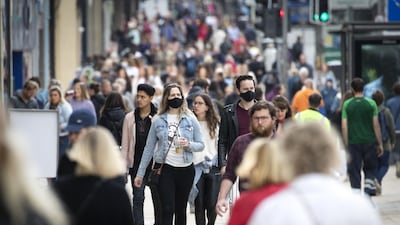Britain's economy rebounded by 7.5 per cent in 2021, its strongest year of growth since the Second World War, after pandemic restrictions were eased across the country, official figures have shown.
The growth in gross domestic product, which exceeded projections by the Bank of England, came despite a 0.2 per cent contraction in the economy in December after the outbreak of Omicron led to tougher restrictions being imposed, the Office for National Statistics said.
Chancellor of the Exchequer, Rishi Sunak, said the government's £400 billion ($542.44bn) package of coronavirus support helped the economy to remain "remarkably resilient" in 2021 "with the UK seeing the fastest growth in the G7 last year and GDP remaining at pre-pandemic levels in December".
“I’m proud of the resolve the whole country has demonstrated and proud of our incredible vaccine programme which has allowed the economy to stay open," he said.
The strong growth in 2021 was in stark contrast to the 9.4 per cent contraction in output in 2020 – the biggest drop since 1919 when there was demobilisation after the First World War – when the pandemic and the resulting lockdown hammered the economy.
However, the UK has enjoyed a stronger recovery than its peers, aided by billions of pounds of government aid to support jobs and firms through the crisis, and its economy still managed to grow by 1 per cent in the last three months of the year.
"When you compare the UK’s performance to other G7 countries over the last year it stands head and shoulders above the rest of the pack. By the final quarter the UK had lost ground as Spain, the US and Canada rocketed forward but Omicron is likely to have played a big part in that story," said Danni Hewson, a financial analyst at AJ Bell.
"Longer term, the UK’s biggest challenge still seems to be productivity growth, which has been lacklustre for over a decade. Until that is fixed the UK economy is likely to have a pretty humdrum underlying pace of growth.”
The 0.2 per cent decline in December came as the hospitality and leisure sector bore the brunt of Omicron and related government restrictions. While the contraction was less than expected, it left the overall size of the economy standing exactly where it was in February 2020, shortly before the pandemic broke out.
Combine December's inflation rate of 5.4 per cent with the 0.2 per decline in GDP in December and it means the economy "experienced a taste of stagflation at the end of last year", said Paul Dales, chief UK economist.
"As it was driven by the Omicron Covid-19 wave which has now faded, the fall in GDP will soon be reversed. But high inflation will be with us for longer and, together with the rise in taxes in April, will restrain GDP growth this year," he added.
Covid-19 infections in Britain peaked around the turn of the year but have since fallen sharply, and the Bank of England forecast last week that it expects the economy to stagnate in the first quarter but rebound strongly in the following three months to return to its pre-Covid size.
The latest GDP figures will be welcomed by Prime Minister Boris Johnson, who is grappling with a brutal cost of living crisis and facing calls to resign over alleged rule-breaking parties when the country was in lockdown. They will also keep the Bank of England focused on efforts to curb surging inflation, which they expect to hit 7.25 per cent in April, with more interest-rate increases likely.
However, the squeeze on household incomes from rising prices and planned tax rises could see economic activity “disappoint over the coming months", said Yael Selfin, chief economist at KPMG UK, who forecasts GDP growth this year of 3.7 per cent.
“The reality is the way the government runs our economy is trapping us in a high tax, low growth cycle,” said Pat McFadden, who speaks on Treasury issues for the opposition Labour Party.
“The latest Bank of England forecast suggests that growth will slow to a crawl next year. That would be the slowest growth of any G7 economy.”
The bank has increased rates at it two previous meetings, taking the benchmark to 0.5 per cent this month, and markets are pricing in a rapid series of further moves this year.
Meanwhile, the trade in goods deficit, excluding precious metals, narrowed marginally in the fourth quarter, with exports growing slightly faster than imports. In December, imports from non-EU countries remained higher than from EU countries for the 12th consecutive month.


